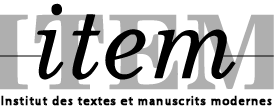01/07/2024 - 01/10/2024, VILNIUS UNIVERSITY
 Genetic scholars, as they follow the evolution of an artwork, seek to grasp the sui generis character of the creative process. This pursuit of an elusive objective recalls a recent provocative tourism campaign launched by Lithuania’s capital to attract a younger demographic.
Genetic scholars, as they follow the evolution of an artwork, seek to grasp the sui generis character of the creative process. This pursuit of an elusive objective recalls a recent provocative tourism campaign launched by Lithuania’s capital to attract a younger demographic.
The ad boldly declared: “Vilnius—the G-spot of Europe. Nobody knows where it is, but when you find it—it’s amazing.” Be as it may, one derives pleasure from genetic research: delving into manuscript materials uncovers the historical contexts the author faced, touches on the intertextual influences the writer engaged with, and pulls the archive reader into discussions about the work’s reception. Reconstructing the genesis means intruding into various realities—both credible and possible—of the work under development. It also involves tracking the mimetic operations employed when the creative mind transforms everyday experiences into fiction and vice versa. However, these textual and non-textual realms reach the scholar in fragments.
Geneticists have persistently experimented with the problem of the perception gap adopting various methods: differentiating creative processes (cf. Genesis 2017), comparing practices across different arts (cf. Genesis 2022), or consulting creative agencies (cf. Genesis 2023). In the words of Aristotle, both genetic scholars and writers operate similarly: “the poet’s job is not relating what actually happened, but rather the kind of thing that would happen” (Poetics, 1451a). Aligning two seemingly impassable mazes of literary studies—genetic reconstruction and mimesis—thus means inspecting the emergence of meaning. From initializing to modifying and, to some extent, stabilizing it, the author (or the critic) inscribes himself into the generative algorithm of surrounding discourses (cf. a semiotic approach by Algirdas Julius Greimas) and constantly breaks this code when creative impulses incite. Integrity and fragility counterbalance each other in the composition process: fictionalizing acts can be recog-
nized within what’s perceived as authorial documentation, while editing sometimes equally both refines and obscures articulated ideas,
et cetera.
Revision may continue ad infinitum, although it remains a mystery how the author determines the moment of aesthesis. Besides, the way geneticist rationalizes the construction materials of the cathartic recoil literature causes in the reader, may not necessarily match with the author’s or editor’s vision for the work’s effect.
(…)
We encourage scholars from diverse disciplines and academic backgrounds to participate. The language of the conference is English with possible sessions in French, if offered. To submit a proposal for a 20-minute presentation, please send an abstract (approximately 300 words), a
short bio, and your affiliation to genesis2025@flf.vu.lt by 1 October 2024. Acceptance notifications will be sent via email on 1 December 2024. Information regarding logistics, registration fee, and other details will be published on the conference website during the registration period.
Pour en savoir plus …. télécharger l’appel ici : Genesis Vilnius 2025 – CFP
![]()

















